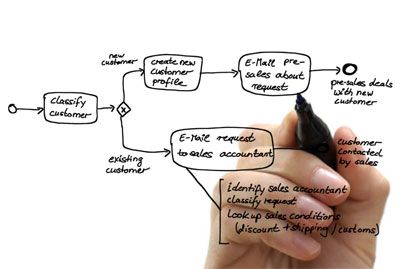
This course introduces concepts of business process modeling using the Business Process Model and Notation (BPMN) industry standard. Participants will learn the elements of process models and their precise meaning. We cover business processes within organizations and also interacting processes involving several organizations, i.e., we investigate process orchestrations and process choreographies. We will also look at techniques to analyze business processes from a formal perspective.
The course centers around concepts and language to describe and analyze business processes. It does not cover methods on how to model, improve, monitor or implement business processes. Still, a deep understanding of business process models is a useful basis for these activities.
Kurssprache: English
Advanced, Enterprise Computing, Expert
Kursinformationen
Business process models play a central role in describing, analyzing, improving, implementing, and monitoring business processes. They can serve as communication medium for professionals with different background and expertise, ranging from business administration, quality management and organizational development to process improvement, systems architectures and software development. The aim of this course is to provide a common understanding and a common language to improve the communication between these professionals during all phases of business process management projects.
This course introduces concepts of business process modeling using the Business Process Model and Notation (BPMN) industry standard. Participants will learn the elements of process models and their precise meaning. We cover business processes within organizations and also interacting processes involving several organizations, i.e., we investigate process orchestrations and process choreographies. We will also look at techniques to analyze business processes from a formal perspective.
The course centers around concepts and language to describe and analyze business processes. It does not cover methods on how to model, improve, monitor or implement business processes. Still, a deep understanding of business process models is a useful basis for these activities.
You'll find additional video lecturing material on www.tele-task.de.
Attention: This course is currently in self-study mode, in which you do not have access to graded assignments/exams. Therefore, we can only issue you a certificate of participation.
Lernmaterial
Week 1:
Introduction to Business Process ManagementWeek 2:
Basic Business Process ModelingWeek 3:
Week 3Bonus:
BonusWeek 4:
Week 4Week 5:
Week 5Week 6:
Process ChoreographiesExam:
Exam
Für diesen Kurs einschreiben
Lernende
Anforderungen für Leistungsnachweise
- Den Leistungsnachweis erhält, wer in der Summe aller benoteten Aufgaben mindestens 50% der Höchstpunktzahl erreicht hat.
- Die Teilnahmebestätigung erhält, wer auf mindestens 50% der Kursunterlagen zugegriffen hat.
Mehr Informationen finden Sie in den Richtlinien für Leistungsnachweise.
Dieser Kurs wird angeboten von

Professor Mathias Weske leitet das Fachgebiet Business Process Technology am Hasso-Plattner-Instituts der Digital Engineering Fakultät der Universität Potsdam. Uns interessieren praktische Probleme im Geschäftsprozessmanagement; wir adressieren diese durch formale Methoden und bauen nützliche Prototypen. Seine Forschungsschwerpunkte sind prozessorientierte Informationssysteme, Process Mining und Event Processing. Das BPT-Forschungsteam verfügt über eine gute Bilanz bei der Entwicklung von Prototypen, was erhebliche Auswirkungen auf Forschung und Praxis hatte, einschließlich Projekte wie Oryx und jBPT. Dr. Weske ist Autor des ersten Lehrbuchs zum Geschäftsprozessmanagement und hielt 2013 den ersten groß angelegten öffentlichen Online-Kurs zu diesem Thema ab. Mathias Weske ist Gründungsmitglied der BPM-Konferenzreihe und seit September 2017 Vorsitzender des Lenkungsausschusses.